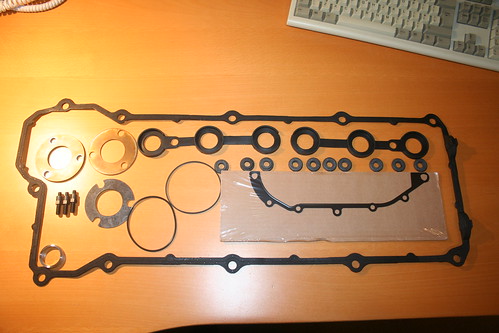BMW M50 VANOS - Variable Valve Timing
The internet is a wonderful resource for finding information easily..............and finding problems too, real or imagined!
The following may not be of general interest, but hopefully may help anyone using a BMW M50TU engine in their Marlin in the future.
Driving back from Stoneleigh was my first long distance run, and allowed me to get a feel of my Cabrio's performance. Subsequent driving has confirmed my initial assessment that it pulls very strongly over 3000rpm, but I feel is disappointing below this band.
Trawling through the BMW forums was both reassuring and worrying.
The M50, with its steel block straight 6 cylinder design has been refined through almost 2 decades such that it is incredibly robust, often exceding 200k miles. However, with the M50 TU (stands for Technical Upgrade) BMW introduced their first variable valve timing system - VANOS. This is designed to improve the power delivery over a wider rev range, and improve fuel efficiency.

The Vanos unit bolts to the front of the head and is the bulge on the right side when viewing the engine as above.
VANOS works by applying controlled oil pressure on a piston which acts on a helical gear set to vary the angle of the Inlet camshaft relative to the Outlet cam/crank.
When new it works well and performs as designed.
However, having trawled the BMW forums, looking for why my engine was less strong below 3000rpm, it became clear very quickly that there is a design weakness in BMW's VANOS: the oil pressure seal is made of inappropriate material, and is usually worn out by around 70k miles. This allows the helical gears to oscillate in and out against the Vanos piston producing the commonly known "VANOS rattle".
There are a couple of remedial actions which can be undertaken with the M50TU Vanos.
The first is to buy a new BMW vanos unit - very expensive!
Secondly buy a refurbished unit from an after market supplier called "DrVanos" at a more reasonable cost (Very good apparently, but still £250).
Thirdly there is a DIY option: Beisan offer a seal kit which cures 95% of the problem for a much more reasonable total cost of around £30. Better still, the new seals are made of material more suited to operating in oil and heat, so are longer lived than the genuine BMW VANOS units.
There are several very good Youtube videos on how to change the Vanos unit, and seals, and it looks pretty straight forward, so this is the route I'll take. The kit from Beisan comprises just two seals, and a new bearing housing:

(- the videos below are 25minutes long, but if you want to know what to do are very good)
Vanos Removal
https://www.youtube.com/watch?v=JPlKrOC718w
Vanos Install
https://www.youtube.com/watch?v=23jXHhkpV_I
BMW were quickly aware of the "Vanos Rattle" and introduced an upgrade in the M52 single vanos engines, changing the single plate No. 9 in the M50 to 3 plates Nos.9, 10. & 11 in the M52.
M50TU Vanos

M52 Vanos

As with a lot of BMW developments this upgrade can be retro fitted to the M50 provided the longer studs (#6) are used too.
The improvement comes from the "Cup Washer" #10 which is a compressed dish plate between two flat plates #9 (2mm thick) and #11 (4mm thick), and helps to stop the cam advance oscillating. It has continued to be fitted to all later BMW heads, so presumably does work.
Ironically BMW charge only £3/4 for the cup washer plate, but want over £30 each for the two flat plates (#9 & #11) - so I sourced a pair from a BMW breaker for £10 delivered!

Of course things are never quite as easy, or as cheap, as you first think, and I've ended up buying a raft of genuine BMW gaskets to replace the old ones when I make the upgrade as the plastic gaskets become brittle and fail on removal:

My expectation is that these upgrades will help improve the low down torque, and eliminate an odd "rattle" I can hear in my engine around 2700rpm - by all accounts a classic Vanos seal failure symptom.